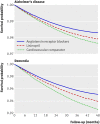Use of angiotensin receptor blockers and risk of dementia in a predominantly male population: prospective cohort analysis
- PMID: 20068258
- PMCID: PMC2806632
- DOI: 10.1136/bmj.b5465
Use of angiotensin receptor blockers and risk of dementia in a predominantly male population: prospective cohort analysis
Abstract
Objective: To investigate whether angiotensin receptor blockers protect against Alzheimer's disease and dementia or reduce the progression of both diseases.
Design: Prospective cohort analysis.
Setting: Administrative database of the US Veteran Affairs, 2002-6. Population 819 491 predominantly male participants (98%) aged 65 or more with cardiovascular disease.
Main outcome measures: Time to incident Alzheimer's disease or dementia in three cohorts (angiotensin receptor blockers, lisinopril, and other cardiovascular drugs, the "cardiovascular comparator") over a four year period (fiscal years 2003-6) using Cox proportional hazard models with adjustments for age, diabetes, stroke, and cardiovascular disease. Disease progression was the time to admission to a nursing home or death among participants with pre-existing Alzheimer's disease or dementia.
Results: Hazard rates for incident dementia in the angiotensin receptor blocker group were 0.76 (95% confidence interval 0.69 to 0.84) compared with the cardiovascular comparator and 0.81 (0.73 to 0.90) compared with the lisinopril group. Compared with the cardiovascular comparator, angiotensin receptor blockers in patients with pre-existing Alzheimer's disease were associated with a significantly lower risk of admission to a nursing home (0.51, 0.36 to 0.72) and death (0.83, 0.71 to 0.97). Angiotensin receptor blockers exhibited a dose-response as well as additive effects in combination with angiotensin converting enzyme inhibitors. This combination compared with angiotensin converting enzyme inhibitors alone was associated with a reduced risk of incident dementia (0.54, 0.51 to 0.57) and admission to a nursing home (0.33, 0.22 to 0.49). Minor differences were shown in mean systolic and diastolic blood pressures between the groups. Similar results were observed for Alzheimer's disease.
Conclusions: Angiotensin receptor blockers are associated with a significant reduction in the incidence and progression of Alzheimer's disease and dementia compared with angiotensin converting enzyme inhibitors or other cardiovascular drugs in a predominantly male population.
Conflict of interest statement
Competing interests: BW and RAW received a grant award from the Retirement Research Foundation to fund this research. BW received a donation from the Casten Foundation to fund this research.
Figures


Comment in
-
Antihypertensive agents and prevention of dementia.BMJ. 2010 Jan 12;340:b5409. doi: 10.1136/bmj.b5409. BMJ. 2010. PMID: 20068256 No abstract available.
-
Angiotensin receptor blocker use may decrease the incidence and progression of Alzheimer's disease and dementia in older men but the strength of the evidence is questionable.J Clin Hypertens (Greenwich). 2010 Jun;12(6):444-6. doi: 10.1111/j.1751-7176.2010.00300.x. J Clin Hypertens (Greenwich). 2010. PMID: 20591090 Free PMC article. No abstract available.
-
Angiotensin receptor blockers associated with decreased incidence and progression of dementia in older men with cardiovascular disease.Evid Based Ment Health. 2010 Aug;13(3):75. doi: 10.1136/ebmh.13.3.75. Evid Based Ment Health. 2010. PMID: 20682815 No abstract available.
References
-
- Whitmer RA, Sidney S, Selby J, Johnston SC, Yaffe K. Midlife cardiovascular risk factors and risk of dementia in late life. Neurology 2005;64:277-81. - PubMed
-
- Nash DT, Fillit H. Cardiovascular disease risk factors and cognitive impairment. Am J Cardiol 2006;97:1262-5. - PubMed
-
- Newman AB, Fitzpatrick AL, Lopez O, Jackson S, Lyketsos C, Jagust W, et al. Dementia and Alzheimer’s disease incidence in relationship to cardiovascular disease in the Cardiovascular Health Study cohort. J Am Geriatr Soc 2005;53:1101-7. - PubMed
Publication types
MeSH terms
Substances
LinkOut - more resources
Full Text Sources
Other Literature Sources
Medical
